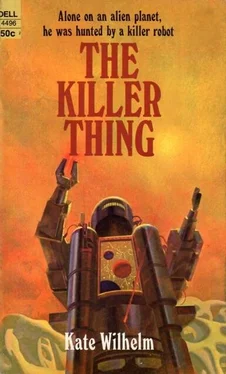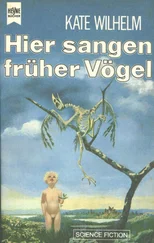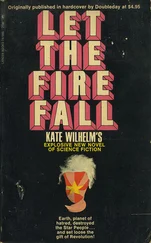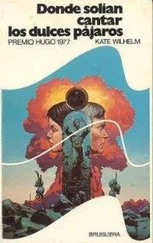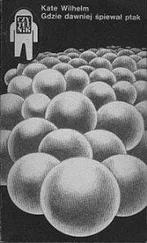His detectors could pick up the radiation from a distance of four miles, but that became almost meaningless as he considered the terrain below him. The rocks were massive here with narrow gorges between them that twisted in sharp angles, now and then opening to a trail-like clearing of nearly fifty feet, again narrowing to two or three feet. Any of the pinnacles would serve to damp the trail of radiation. From his vantage point he could see how well concealed his valley actually was from the ground approaches; also, he could see that there were only two other entrances to it, with a third that had become choked with rocks. It would be easily fortified if he failed to find and enter the other dinghy.
He finished the first turn and headed out another mile and a half, the ground unchanging below, with the cliffs, peaks, obelisks all the same, the same tumbled masses of rocks that had cracked and flaked off, now lying in heaps of rubble. There was the start of a plateau, a high mesa that was windswept clean, level, with stair-like approaches to it. He slowed even more to study it carefully, knowing that his fuel was being consumed faster each time he decelerated. The mesa was of granite, not the black basalt he was searching for. He went on, picking up speed again. He finished the second sweep around the valley. His radiation system continued quiet.
The heat was building up in the dinghy; inside his suit he was perspiring heavily, and he was starting to have a peculiar optical illusion: the land seemed to hunch itself up into the jagged peaks, then abruptly the ground would change and there seemed to be sudden, deep holes with precipitous sides and black slides that led to the centre. The effect was dizzying and for ten or fifteen minutes he kept his attention on his controls, relying solely on the radiation alarm. He welcomed the mesa, when he approached it again, as he would have a familiar sight back on Venus, or even on Earth which he hadn’t seen since his twentieth birthday. The mesa seemed to go on for miles, flat, sheered off neatly. The third lap had been covered. The shadows were now pronounced, as sharp and cruel as the rocks that cast them, and on each north and south sweep, the sun shone straight in the dinghy, and he was forced to close the ports and depend wholly on his screen. Viewing the savage land through the screen seemed merely to remove it further from reality, to make it easier to succumb to the changing ground as it rose in mountain peaks and then fell in craters and crevices.
He had gone less than four miles around the next lap when the radiation alarm sounded, bringing him up with a start of excitement and fear. It became silent almost immediately and desperately he turned, circling back to where he had picked up the beep. He set the controls to follow it, flying as low as he could around the peaks, around the mesa for almost a mile, and then climbing over it, zigzagging back and forth, detouring only when there was a mass of rocks too steep for the robot to have navigated. Suddenly there were two lines on the screen, the trail was being crossed by another; the robot had crossed its own path. He hesitated momentarily, then decided to stick with the first trail. He went to the edge of the ten-mile circle he had drawn, continued three miles beyond, then turned back, retracing the hot path to the intersection. His dinghy was recording his route, marking the trail of radiation for him. If he had to leave it unfinished that day, there would be the next; he would be able to start again exactly where he left off. He followed the second trail for another eight miles, taking it to the edge of the outermost circle, then turned back on it to follow it the other way. The shadows were lengthening fast, and he knew he had no more than another half-hour before he would be forced to return to the valley. The path was crossed again, and then again, and he fought back the waves of doubt that passed through him.
If all the land continued to be so crisscrossed with the trails, it might become impossible to follow any of them…
He would have to return and go on foot, groping with his hands to discover the invisible dinghy. Finally he knew that he had to turn back. In minutes the wind would start to blow; the shadows were black stripes over the land now, and the white spaces were grey. He didn’t want to be out when the white spaces were gone, when the black shadows claimed all of the land. It was only nine miles back to the camp site in a straight line. The wind was a thin, distant shrilling when he circled the valley and dropped slowly to the floor, and then crept back to the safety of the chimney.
He was rigid with tension when he turned off the engines. He was able to relax only with great effort. To have come so close to locating the dinghy, and then to have failed. He checked his fuel consumption: he had flown a total of one hundred and thirty-four miles; there would be approximately that many miles left to him to fly before the fuel became dangerously low, too low to leave the valley again.
He stripped off his sodden suit and wiped his body thoroughly with a treated square of soft material that at first felt cool against his skin, but too soon became hot and sticky with his sweat. He was running out of squares. God, how he stank! He threw the cloth pieces into the disposer and tried not to think of all the water he had used on Duncan. He thought longingly of a swim, or a cool shower, or a plunge in a sudsy bath. When he had finished trying to clean himself, there was little else he could do. His stiffness had returned along with the soreness of his muscles, and the assorted aches and pains where rocks and sand had cut and bruised him. His head ached from the strain of watching the sharply etched land streak by as he had flown over it. He looked at the aerial map he had made, crisscrossed with the hot trail; he put it aside. He couldn’t stop the feeling of motion the map gave him. He sat again on the edge of the seat-bed and he put his head down in the palms of his hands. If only there were something he could be doing.
Waiting was harder than physical activity, harder than daring the tornado winds, harder than trudging out under the burning sky. Why weren’t they trained in aloneness? Why was each man so carefully guarded from being alone, from the time he first arrived on Venus until the time of his death? Always in twos, or in groups, or squadrons, or battalions ― never alone. He must have had hours alone when he was a child. He could remember none. There had been the apartment, one of four hundred in the complex, with a giant nursery that housed seven hundred pre-school children of two to four years, and after that had come the school, and the dormitory at night, and the playgrounds alive with youngsters, teeming with them as a drop of water from a pond teems under a microscope. Then Venus and another dormitory… Never alone. He could hear the screaming of the wind as if it were far removed from him, and he wished almost that he had parked the dinghy out under an overhang after all. Inside the chimney even the wind chose to leave him with his isolation.
He should eat again. Then he could write letters, or bring the log up to date… or study the maps and make plans… With a start of surprise he considered the log: he had forgotten it for days. It would require hours to complete and up-date. He felt cheerful when he pulled it out and began glancing through it. He opened it to the entry of the day after Duncan’s death and burial, the start of his lone game of hide and seek with the robot. He shuddered, remembering the beam playing on the shallow grave, then flowing along the ground towards him. How long ago had it been? He couldn’t remember. He tried counting back, but the days blurred and ran together. Later, after he ate, he would work on the log. Later he would be able to remember what happened each day. There was the day that he had gone out on to the desert, hoping to lure the monster out on the sands, hoping it would sink, be mired, incapacitated…
Читать дальше
